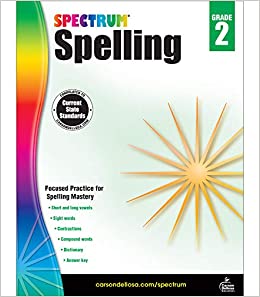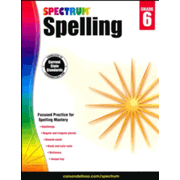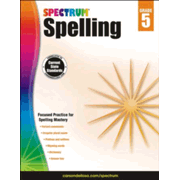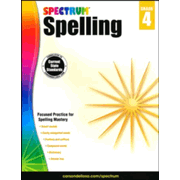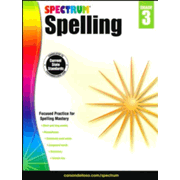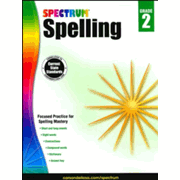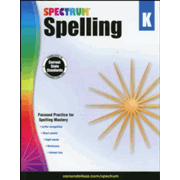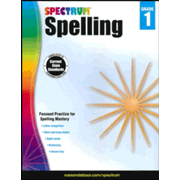Spectrum® Spelling is a phonetically-based spelling program for kindergarten through sixth grade that should require less teaching time for the daily lessons than some other programs. These workbooks are titled by grade level and are attractively printed in full color.
The first workbook, Spectrum Spelling: K, and the first third of Spectrum Spelling: Grade 1 have phonics activities rather than spelling lists. On page 72 of Grade 1, students encounter their first list of six spelling words. The number of words taught each week gradually increases to 15 per week in Grade 4 through Grade 6.
While most of the word lists have common phonetic elements, each workbook includes some lessons with words related in some other fashion such as “food words,” “season words,” and “family words.” Students also learn to spell some sight words. Beginning with Grade 2, each workbook also has a lesson covering words that are confusing or easily misspelled.
The number of lessons varies significantly in each workbook, from a low of 22 lessons in Grade 5 to a high of 32 lessons in Grade 2. All of the workbooks are set up with four pages of activities for each week’s lesson. Two-page review lessons are inserted periodically. There are seven to nine review lessons per workbook.
Beginning in Grade 1, students are given assignments to write sentences using some of their spelling words. The amount of writing gradually increases so that students might be writing one or two paragraphs at the upper levels. All of the other activities have predictable answers.
Each of the workbooks includes a dictionary of that grade's spelling words and an answer key with reduced images of student pages with overprinted answers. That means that each of these workbooks is self-contained, and you do not need a teacher’s manual or separate answer key. Students should be able to complete all of their work in the workbook. You might want to remove the answer key pages to avoid the temptation to cheat.
Very clear instructions for what to do appear on the student's pages. However, there are no specifications at all for giving spelling tests. You will probably want to administer a spelling test at the end of each week, but you might wait until at least second grade to begin spelling tests.
The difficulty increases with each workbook. In Grade 1, the first 56 pages focus on individual letters of the alphabet and their sounds. Students begin to write three-letter words on page 57. The activities in the first third of Grade 1 are like those in a phonics workbook rather than spelling. On page 75 of Grade 1, students are supposed to begin writing a sentence using some of their spelling words. This represents a rapid shift from writing individual letters at the beginning of the workbook to writing complete sentences, so children might need to dictate what they want to say. You might skip over some of the beginning lessons of Grade 1 with a first grader who is ready to write words, or you might start a kindergartner in this workbook, and only go as far as is appropriate, saving the rest for the next year.
The other workbooks also start out easy but quickly become more challenging. For instance, Grade 2 groups words by word families and common phonetic elements. While the first lesson begins with three-letter, short-vowel words, the lessons continue through long-vowel words, words containing ow and ou, words with suffixes, words for family members, contractions, and compound words. The words are appropriate for second grade, but you might be fooled into thinking it’s too easy if you look only at the first few lessons.
Grade 3 through Grade 6 similarly begin with short-vowel words and gradually increase in difficulty. However, the short-vowel words are not necessarily easy words. For example, Grade 6 begins with short-vowel words such as distance, canyon, and pleasant. It continues with words grouped by challenging phonetic components such as ci and ti, compound words, contractions, plurals, possessives, prefixes, suffixes, homophones, and words with Latin and Greek roots.
Summary
Spectrum Spelling is a very inexpensive option for teaching spelling. It should be very easy for parents to administer once children are able to read independently.





